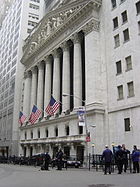Secondary Marketing on Wikipedia
Secondary market
From Wikipedia, the free encyclopedia
The secondary market is the financial market for trading of securities that have already been issued in an initial private or public offering. Alternatively, secondary market can refer to the market for any kind of used goods. The market that exists in a new security just after the new issue, is often referred to as the aftermarket. Once a newly issued stock is listed on a stock exchange, investors and speculators can easily trade on the exchange, as market makers provide bids and offers in the secondary marketing.
Function
In the secondary market, securities are sold by and transferred from one investor or speculator to another. It is therefore important that the secondary market be highly liquid and transparent. Before electronic means of communications, the only way to create this liquidity was for investors and speculators to meet at a fixed place regularly. This is how stock exchanges originated, see History of the Stock Exchange.
Secondary marketing is vital to an efficient and modern capital market. Fundamentally, secondary markets mesh the investor's preference for liquidity (i.e., the investor's desire not to tie up his or her money for a long period of time, in case the investor needs it to deal with unforeseen circumstances) with the capital user's preference to be able to use the capital for an extended period of time. For example, a traditional loan allows the borrower to pay back the loan, with interest, over a certain period. For the length of that period of time, the bulk of the lender's investment is inaccessible to the lender, even in cases of emergencies. Likewise, in an emergency, a partner in a traditional partnership is only able to access his or her original investment if he or she finds another investor willing to buy out his or her interest in the partnership. With a securitized loan or equity interest (such as bonds) or tradable stocks, the investor can sell, relatively easily, his or her interest in the investment, particularly if the loan or ownership equity has been broken into relatively small parts. This selling and buying of small parts of a larger loan or ownership interest in a venture is called secondary market trading.
Under traditional lending and partnership arrangements, investors may be less likely to put their money into long-term investments, and more likely to charge a higher interest rate (or demand a greater share of the profits) if they do. With secondary markets, however, investors know that they can recoup some of their investment quickly, if their own circumstances change.
Computerized loan origination systems
Mortgage broker to mortgage banker
Labels: secondary market, secondary marketing


0 Comments:
Post a Comment
<< Home